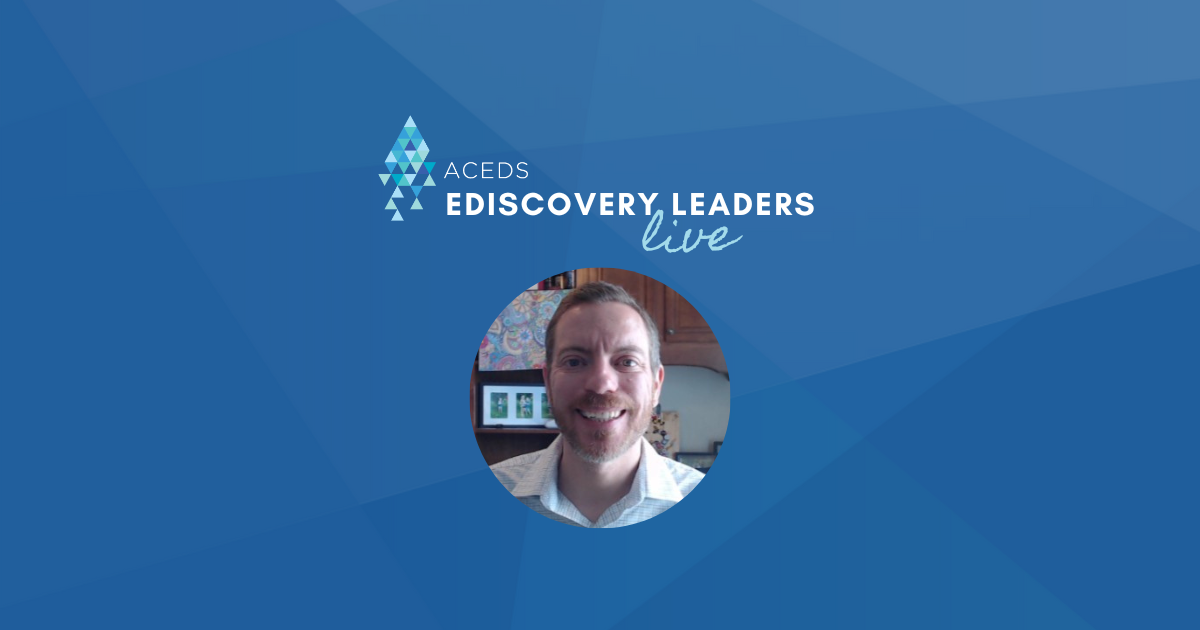eDiscovery Leaders Live: Cory Osher of UnitedLex
Cory Osher, Vice President, Analytics & AI at UnitedLex, joins George Socha, Senior Vice President of Brand Awareness at Reveal, for ACEDS #eDiscoveryLeadersLive at the Georgetown Advanced eDiscovery Institute.
With over 20 years of litigation, regulatory, and technology experience and nearly a decade at UnitedLex, Cory currently serves as the Vice President of Analytics and AI. Focusing on driving innovation and automation, Cory oversees a team of experienced consultants who implement cost-effective, AI-enabled, defensible, and repeatable workflows across the EDRM.
Cory began by sharing his thoughts on day one of the Georgetown conference. He then expanded to scope of the discussion to broader trends and challenges facing client, in particular how to deal with collaboration content and with ever-changing systems. From there, he discussed his role at UnitedLex, the AI and analytics work they do, and how clients benefit from that work. Cory spend the bulk of our time together talking about AI, AI models, sentiment analysis, and UnitedLex’s data science team, and how at UnitedLex they use various forms of AI to assist clients. At the end, Cory took us back to search terms and where they fit in, and closed with thoughts about next challenges and his ideal eDiscovery platform.
Key Highlights
- [1:43] Thoughts on day one of the 2022 Georgetown Advanced eDiscovery Institute.
- [2:15] The interesting lack of discussion at the sessions about using AI.
- [4:16] Discussions at the conference about privacy.
- [5:09] The value of the open exchange of ideas that the conference provides.
- [5:41] Broader trends and challenges that clients face: data from collaboration platforms, ever-changing systems.
- [6:29] His role overseeing their AI capabilities, ECA, analytic and TAR workflow consultants, and data solutions developers.
- [6:55] The value of have a team of data solutions developers.
- [7:40] Analytics and AI at UnitedLex.
- [8:54] Examples of how to use analytics to find nuanced key issues.
- [9:48] AI defined, broadly and narrowly.
- [11:42] Ai models defined.
- [12:34] Using Reveal’s out-of-the box models and building their own models.
- [13:31] Reusing AI models.
- [14:16] Client response to the concept of using AI models.
- [14:46] It’s not whether to use AI but how.
- [15:33] CAL adoption rates.
- [16:29] What sentiment analysis is and how it can be used.
- [17:51] Client reaction to sentiment analysis.
- [18:23] Their own data science team and what those folks do.
- [19:18] Roadblocks to adoption of AI capabilities.
- [20:42] And ways past the roadblocks.
- [21:20] The role of search terms with Teams, Slack, and similar data.
- [23:06] If not search terms, then what?
- [23:47] Other observations from Georgetown.
- [24:50] The next challenges: privacy and new mediums of communication.
- [25:41] His ideal eDiscovery platform.
Key Quotes
- “I thought it was interesting that there’s still some friction there in getting whether it’s inhouse or outside counsel to leverage the technology that’s available to meet these challenges.”
- “What [our team of data solutions developers] does is work to use our proprietary tools to help deal with these challenges of parsing out JSON files or different Slack data types that you might be getting and when these updates happen, staying ahead of the curve to deal with those challenges.”
- “What we do is help our clients get to the evidence faster. We’re leveraging all sorts of third-party and proprietary technology to help drive those outcomes.”
- “[When reusing AI models] we collaborate in such a way to make sure that whatever confidentiality or privacy might be involved that there is a line there not to crosspollinate those things and also get express consent from our clients to use their data to build a model….”
- “It’s at the point where our clients, they’re not asking are we going to use AI. It’s, how are we going to use it on this particular matter.”
- “We have certain clients, they will use CAL, they want to use it on every project….”
